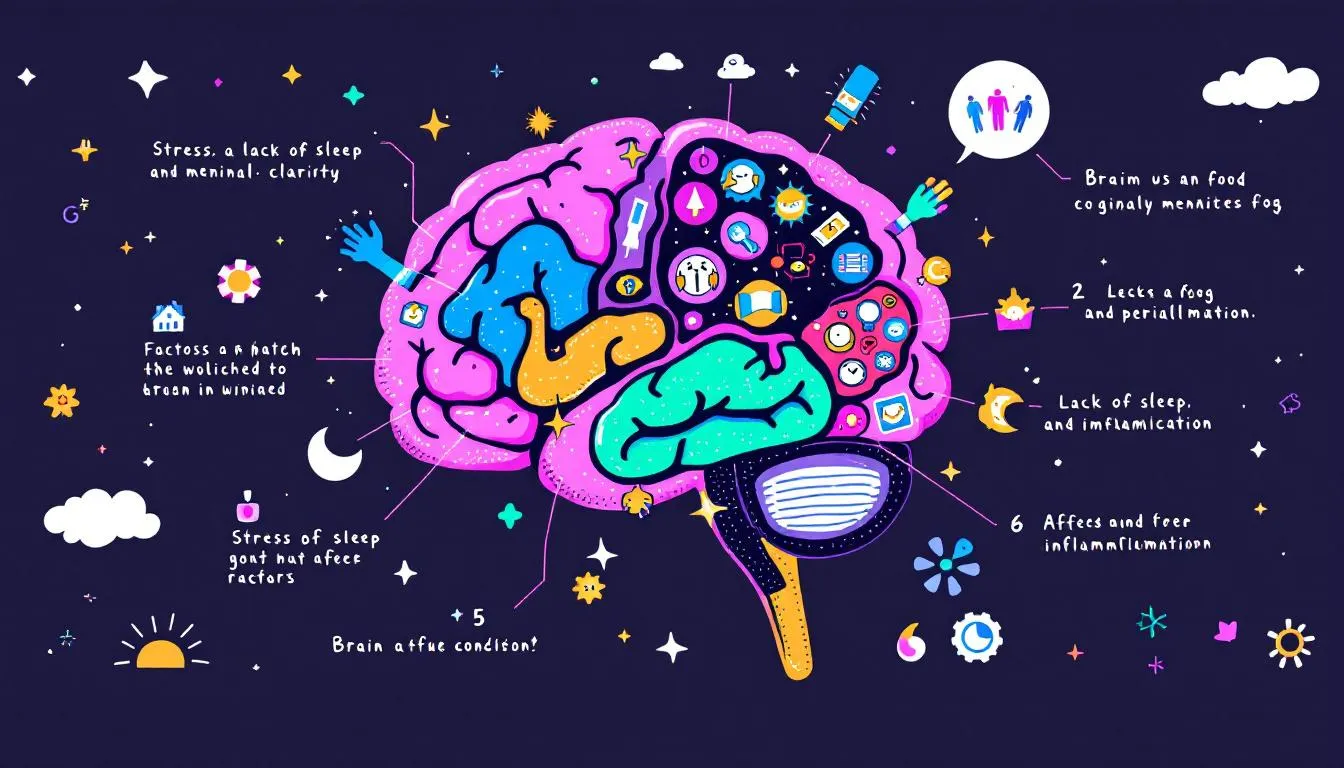Causes of Brain fog?
Top Causes of Brain Fog You Need to Know
Are you experiencing brain fog and want to know why? This article covers the primary causes of brain fog, such as sleep problems, stress, hormonal shifts, poor diet, and other factors. Let’s get to the root of it.
Key Takeaways
- Sleep disorders, particularly Obstructive Sleep Apnea, significantly impair cognitive function, making improved sleep hygiene essential for reducing brain fog.
- Stress and anxiety are major contributors to brain fog, and proactive management through mindfulness and exercise can enhance mental clarity.
- Diet and lifestyle choices, including the MIND diet and regular physical activity, play pivotal roles in maintaining cognitive health and combating brain fog.
Sleep Disorders and Poor Sleep

Sleep is the cornerstone of mental well-being, yet millions of people struggle with sleep disorders that wreak havoc on cognitive function. Poor sleep can lead to a myriad of issues, including mental fatigue, poor concentration, memory problems, and thought-related challenges.
One of the major culprits is Obstructive Sleep Apnea (OSA), a sleep disorder characterized by interrupted breathing during sleep. These episodes of OSA can cause sleep fragmentation, preventing restorative sleep and resulting in persistent cognitive impairments. More alarmingly, the intermittent drops in blood oxygen levels during these episodes may contribute to brain inflammation and cognitive decline.
Enhancing sleep hygiene can reduce cognitive symptoms linked to brain fog. Simple lifestyle adjustments, like maintaining a consistent sleep schedule and creating a restful environment, can significantly improve sleep quality. Over time, these changes can lead to improved concentration and reduced feelings of mental fog.
Sleep disorders are a significant medical condition that can have profound effects on cognitive function. Tackling these issues head-on can improve mental clarity and overall quality of life.
Stress and Anxiety

Stress and anxiety are silent saboteurs of brain health, often leading to a pervasive sense of mental fog. Chronic stress negatively impacts brain function and can severely impair one’s ability to focus and remember tasks. The mental fatigue resulting from high levels of stress and burnout is palpable, making even the simplest of tasks feel insurmountable.
Mental health conditions like depression and anxiety can exacerbate these cognitive impairments, leading to difficulty concentrating, confusion, and memory issues. Individuals under high stress often report mental exhaustion, struggling with focus and memory.
However, there is hope. Mindfulness practices, regular exercise, and support from friends and family can alleviate cognitive cloudiness. Incorporating these practices into daily life can improve overall brain health and reduce stress’s impact on cognitive functions.
Managing stress and anxiety is crucial in the battle against brain fog, as high levels of stress can cause brain fog. Proactive steps to reduce stress can reclaim mental clarity and enhance cognitive performance.
Hormonal Changes
Hormonal changes, particularly in women, can significantly affect cognitive function, often leading to brain fog. The menopausal transition, marked by fluctuating estrogen levels, is a prime example. During perimenopause, many women report cognitive changes such as memory and concentration problems.
Research suggests that these hormonal fluctuations can lead to deficits in attention and processing speed, making it harder to perform daily tasks. Neuroimaging studies have shown changes in brain activity patterns in perimenopausal women, which may be related to these cognitive performance issues.
The variability in reproductive hormone levels during perimenopause has been associated with cognitive deficits in some studies. However, it’s worth noting that these cognitive issues tend to improve post-menopause, leading to a lifting of the mental fog.
Recognizing the impact of hormonal changes on brain function helps women undergoing menopause manage cognitive changes and maintain mental clarity.
Diet and Nutrition
What we eat plays a pivotal role in our cognitive function and overall brain health. A diet rich in:
- leafy greens
- berries
- whole grains
- fish like the MIND diet, is linked to better cognitive function and slower cognitive decline. Studies indicate that individuals following a MIND diet have a lower risk of experiencing cognitive issues compared to those with less healthy eating patterns.
Conversely, poor nutrition and food allergies can lead to cognitive dysfunction and mental fog. Unhealthy lifestyle habits, such as poor diet and lack of sleep, significantly contribute to brain fog and decreased concentration. Reducing red meat, sweets, and fried foods intake is associated with improved cognitive health.
Nutritional choices can also influence levels of brain inflammation, which may impact cognitive function and contribute to brain fog. Maintaining a balanced diet improves overall brain health, minimizes fatigue, and enhances cognitive clarity.
Diet and nutrition are fundamental to mental clarity. Informed dietary choices support cognitive function and reduce brain fog.
Medical Conditions
Various medical conditions can contribute to the onset of brain fog, each presenting unique challenges. Chronic fatigue syndrome (CFS), for instance, is characterized by extreme fatigue and cognitive difficulties, often manifesting as issues with memory or concentration. The exact cause of CFS remains unclear, but it may arise from a combination of genetic factors, prior infections, or significant physical or emotional trauma.
Chronic pain conditions like fibromyalgia are also linked to brain fog and fibro fog, as they are associated with fatigue and cognitive impairments. Individuals with these conditions often report a persistent sense of mental fog that can make them feel foggy and significantly affect their daily life.
Autoimmune diseases, such as Multiple Sclerosis (MS), infiltrate the central nervous system and target the nerves, leading to cognitive symptoms like brain fog, fatigue, and mobility issues. These medical conditions highlight the complex interplay between physical health and cognitive function, particularly in the context of the immune system and autoimmune disease.
Understanding the link between medical conditions and brain fog is vital for effective management. Addressing the underlying cause with healthcare providers can lead to appropriate treatment and improved cognitive health.
Medications and Treatments
Medications and treatments can sometimes be a double-edged sword, providing relief for one condition while causing brain fog as a side effect. Chemo brain refers to the cognitive challenges that cancer patients may face. These difficulties can occur during or after chemotherapy treatment. Symptoms include:
- Memory lapses
- Difficulty concentrating
- Reduced multitasking ability
- Trouble with word-finding
Up to 75% of cancer patients may experience symptoms of chemo brain, highlighting the significant impact of cancer treatment on cognitive function. Other medications, including those used in chemotherapy, can also contribute to brain fog. Common pharmacological treatments for brain fog include antidepressants and nonsteroidal anti-inflammatory drugs (NSAIDs).
Consulting a healthcare provider helps identify the underlying cause of brain fog and determine appropriate treatment options. Addressing brain fog related to mental health may involve lifestyle changes and psychotherapy to boost cognitive function.
Navigating the complexities of medications and treatments requires collaboration with healthcare providers to find the best solutions for cognitive health, as highlighted in a systematic review and narrative review, thinking about the various options available.
Infections and Immune Response
Infections and the body’s immune response can also play a significant role in causing brain fog. Post-COVID brain fog, for instance, has become a common cognitive impairment among those who have contracted the virus. Around 40% of college students who contracted COVID-19 reported experiencing brain fog.
The exact mechanisms behind post-COVID brain fog remain unclear. However, it could be associated with inflammation impacting the brain or neurological effects caused by the virus. Brain fog can persist for several months after the initial COVID infection, making it a concern for many long covid patients.
Understanding the role of infections and immune response in brain fog is essential for developing effective treatments. Recognizing these factors allows individuals to manage cognitive symptoms and improve brain health.
Neurological Conditions

Neurological conditions are another major contributor to brain fog. Postural Tachycardia Syndrome (POTS) is a prime example, significantly affecting cognitive function, especially when patients are in an upright position. In POTS patients, cognitive performance, particularly working memory, is notably impaired when upright, which improves after hydration.
Patients with POTS often report commonly reported cognitive symptoms such as difficulty focusing and other symptoms, which are accompanied by heightened norepinephrine levels. The severity of cognitive impairment in POTS correlates with the patients’ perceived symptom severity, indicating a connection between subjective feelings and cognitive function.
Understanding the impact of a neurological condition on cognitive function is vital for effective management. Addressing these conditions can improve cognitive health and reduce brain fog.
Lifestyle Factors
Lifestyle choices play a significant role in the occurrence of brain fog. Improving physical activity is recommended as part of a comprehensive approach to managing cognitive difficulties. Regular physical and cognitive exercises can help alleviate brain fog, enhancing overall brain health.
A stable internet connection is crucial for minimizing distractions that can exacerbate cognitive issues, including brain fog. An unstable internet connection can hinder productivity and contribute to feelings of mental fatigue. Taking breaks during tasks can help refresh the mind and improve focus.
Adopting a healthy lifestyle can significantly reduce the impact of brain fog. Informed choices about physical activity, internet usage, and work habits lead to improved cognitive function and mental clarity.
Mental Health Conditions

Mental health conditions like depression and anxiety can significantly affect cognitive function and concentration. Daytime sleepiness associated with sleep disorders can mimic depressive symptoms, complicating diagnosis and treatment. People suffering from untreated sleep apnea are more likely to experience increased symptoms of depression and anxiety.
Addressing mental health issues alongside sleep disorders is vital for improving cognitive functions and overall well-being. By recognizing the impact of mental health conditions on cognitive function, individuals can take proactive steps to manage these issues and improve their mental clarity.
Summary
Summarizing the key points discussed, it’s clear that brain fog can arise from a variety of causes, including sleep disorders, stress, hormonal changes, diet, medical conditions, medications, infections, neurological conditions, lifestyle factors, and mental health. Each of these areas presents unique challenges but also opportunities for improvement.
By understanding and addressing these factors, individuals can take actionable steps toward reducing brain fog and enhancing their cognitive function. Remember, a clearer, more focused mind is within reach.
Frequently Asked Questions
What is the leading cause of brain fog?
The leading cause of brain fog is often attributed to inadequate sleep, as well as underlying health conditions such as autoimmune disorders, mental health issues, or hormonal changes. Addressing these factors may help alleviate symptoms effectively.
How can sleep disorders lead to brain fog?
Sleep disorders disrupt restorative sleep, resulting in cognitive impairments and mental fatigue, which ultimately manifests as brain fog. Therefore, addressing sleep quality is crucial for mental clarity.
Can stress and anxiety cause brain fog?
Indeed, chronic stress and anxiety can lead to brain fog, impairing concentration and memory. It is essential to manage these feelings to maintain cognitive clarity.
How does diet affect cognitive function?
A balanced diet that includes leafy greens, berries, whole grains, and fish significantly enhances cognitive function, whereas inadequate nutrition may lead to cognitive dysfunction and brain fog. Thus, maintaining a healthy diet is crucial for optimal brain health.
What role do hormonal changes play in brain fog?
Hormonal changes significantly contribute to brain fog, especially during menopause, impacting memory and concentration. Thus, understanding these changes can help manage cognitive difficulties during this phase.